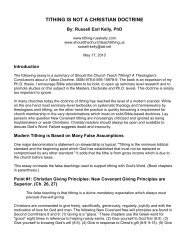âWill a Man Rob God?â (Malachi 3:8) - Biblical Foundations
âWill a Man Rob God?â (Malachi 3:8) - Biblical Foundations
âWill a Man Rob God?â (Malachi 3:8) - Biblical Foundations
You also want an ePaper? Increase the reach of your titles
YUMPU automatically turns print PDFs into web optimized ePapers that Google loves.
20<br />
According to France, in both Matt 23:3 and 23 the statement expressing approval of the<br />
scribes’ teaching serves as one side of the contrast, yet the emphasis in both cases lies on the<br />
other side. 121 In Matt 23:3, Jesus is in effect saying, “You may follow their teaching if you like,<br />
but don’t imitate their behavior.” In Matt 23:23, the import of Jesus’ words is, “Go on observing<br />
their tithing rules if you wish, but don’t let this distract you from the weightier matters of the<br />
Law.” 122 Blomberg properly concludes that, “Whether [tithing] continues to be required in the<br />
era of the new covenant must be determined on the basis of other passages.” 123 The focus of this<br />
passage is on the disproportionate emphasis the scribes and Pharisees placed upon tithing these<br />
spices while neglecting the more central matters of the Law, not upon the issue of continuity vs.<br />
discontinuity. Jesus “is not here questioning how the ‘former’ will relate to the reign he now<br />
inaugurates (12:28) or the church he will build (16:19), any more than in vv. 16–22 he discusses<br />
what role the temple altar plays under the new covenant.” 124<br />
Luke 18:9–14. In Luke 18, Jesus tells a parable about a tax collector and a Pharisee.<br />
Blomberg correctly views this as a two-point parable. 125 Jesus’ main point is not tithing or<br />
stewardship, but humility: “He who exalts himself will be humbled, and … he who humbles<br />
himself will be exalted.” 126 In this parable, Jesus again does not prohibit tithing. However, the<br />
one justified, the tax collector, is never said to have tithed. It would be inappropriate and tenuous<br />
to attempt to draw any more conclusions concerning tithing from this parable. Jesus never tells<br />
people to stop tithing; he does say that tithing is part of the Law and that it should be practiced<br />
with the proper attitude. 127<br />
Tithing in the Rest of the New Testament<br />
Hebrews 7. As Duval and Hays contend, “Much of the message of the Bible is embedded<br />
in larger units of texts. Discovering this message requires us to make observations at the<br />
121 R. T. France, Matthew: Evangelist and Teacher (Grand Rapids: Academie, 1989), 194, n. 58, citing <strong>Rob</strong>ert<br />
Banks, Jesus and the Law in the Synoptic Tradition, SNTSMS (Cambridge: Cambridge University Press, 1975),<br />
175–80.<br />
122 France, Matthew, 194, n. 58 (emphasis original).<br />
123 Blomberg, Neither Poverty Nor Riches, 136.<br />
124 Donald A. Carson, “Matthew,” in The Expositor’s Bible Commentary (vol. 8; ed. Frank E. Gaebelein; Grand<br />
Rapids: Zondervan, 1984), 481.<br />
125 See Craig L. Blomberg, Interpreting the Parables (Downers Grove: InterVarsity Press, 1990), 257–58.<br />
126 Ibid., 258.<br />
127 While Jesus is never said to have tithed, this can probably be assumed. See Smith, “Tithe,” 23, who says:<br />
“Undoubtedly, the first Christians were tithers because practically all of them were faithful Jews.”








